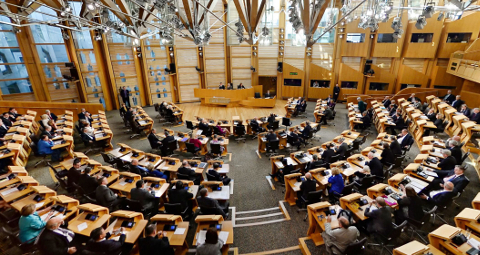BY Daniel Harkins | September 27 | ![]() 0 COMMENTS
0 COMMENTS ![]() print
print

Scottish Government, SNP and Labour commit to supporting Catholic education
“Catholic schools have been a valued part of the Scottish education system for more than 100 years and we support the continuing positive contribution that denominational education has made in ensuring we have successful learners and responsible citizens,” Mr Swinney told the SCO.
Scotland’s education minister, Deputy First Minister John Swinney, has reiterated the government’s support for Catholic schools after a week of sustained attacks.
“Catholic schools have been a valued part of the Scottish education system for more than 100 years and we support the continuing positive contribution that denominational education has made in ensuring we have successful learners and responsible citizens,” Mr Swinney told the SCO.
His comments were echoed by two of Scotland’s major political parties, as senior SNP and Labour politicians rejected the argument that Catholic schools cause sectarianism.
The Scottish Conservatives, Scottish Greens and Scottish Liberal Democrats were also all offered the opportunity to write for the SCO.
Below are Patrick Grady and Elaine Smith’s comments to the SCO in full:
Patrick Grady, SNP MP for Glasgow North and the party’s Westminster chief whip
In November last year, both of Scotland’s Archbishops were present in the Palace of Westminster—probably for the first time since the Papal Visit of 2010—for a special reception to mark 100 years of the Education (Scotland) Act, which provided for state support for Catholic Schools.
It was my huge privilege to host that event. It represented a strong endorsement of the theme of the anniversary year, ‘Catholic Schools—Good for Scotland,’ which earlier in the year had been similarly endorsed by the First Minister.
Delivering the annual Cardinal Winning Lecture in June 2018, Nicola Sturgeon said, very clearly, ‘the Scottish Government is an unequivocal supporter of Catholic schools.’
She also reflected on the reasons for the schools coming into the state system in the first place—including an end what was effectively double-payment by Catholic parents paying fees for their children’s school while also paying rates that financed the state sector.
So there were, and are, good reasons for public funding of faith-based education.
There continues to be demand from parents —of many different faith backgrounds—for the particular ethos and holistic approach found in Catholic schools.
The state system also continues to recognise and respond to demand for diversity and specialisms where appropriate, for example in the growing popularity of Gaelic-medium education in many local authority areas.
Questioning the purpose of faith-based education, and whether it is a cause of sectarianism in modern Scotland, makes for good newspaper headlines and chatter on radio phone-in shows.
What these often lack, however, is analysis or evidence that this is in fact the case.
No school in Scotland, faith-based or non-denominational, teaches bigotry and hatred. Tolerance, inclusivity, and global citizenship are integrated throughout the Curriculum for Excellence. And love of neighbour, and respect for human dignity, are fundamental tenants of the Catholic Faith.
Anyone using foul or offensive language, seeking to insult or intimidate others, or thinking that spitting on other people is a good idea, did not learn these practices in a modern Scottish classroom.
Indeed, the Scottish Government’s Independent Advisory Group on Tackling Sectarianism in Scotland found no evidence to support the view that sectarianism would be eradicated by closing denominational schools and concluded that sectarianism cannot be attributed to a single type of schooling.
The Advisory Group was very clear in their reports that they ‘do not believe that sectarianism stems from, or is the responsibility of, denominational schooling, or, specifically, Catholic schools, nor that sectarianism would be eradicated by closing such institutions.’
The Catholic community in Scotland should value and cherish its schools. My education in St Joseph’s Primary in Inverness helped shaped my understanding and approach to the Church, the Sacraments, and the presence of God in our daily lives.
But the school—or indeed the local parish—is not the beginning and end of a faith-based education.
Faith needs to be put into action in our daily lives—working for a fairer and more just world—and that is what will bring about an end to bigotry and discrimination once and for all.
Elaine Smith, Labour MSP for Central Scotland
State-run Catholic schools give children not only a foundation of their Faith but also an understanding of the world around them.
Despite being in existence since 1918, state faith schools have again come under attack. This time the attacks on these much-loved schools has come under the guise of ending ‘sectarianism’ in Scotland after a spate of recent high-profile incidents in Glasgow.
However, official statistics paint a very different picture to the one we hear in the tabloid press.
Roman Catholics are subject to more attacks than all other religious groups combined: indeed half of all the reported hate crimes are against Roman Catholics. I am reminded of Archbishop Philip Tartaglia’s words when he said, ‘our problem is not so much sectarianism, but anti-Catholicism.’
If sectarianism could simply be resolved by the removal of Catholic schools, then how do we explain and resolve other forms of bigotry? There are 2,000 Catholic Schools in England and Wales; if Catholics schools cause sectarianism then why is it not such an issue there?
Let me be clear, Scottish Labour fully supports Catholic and other faith schools’ right to exist. Abolishing Catholic schools will not end the attacks on Catholics in Scotland.
I was fortunate to have enjoyed a Catholic education and have also taught in Catholic schools. The ethos of Catholic schools is one of inclusivity.
During my own school days, and while teaching, I was aware of the exceptional academic encouragement and pupils being inspired to lead good lives built on Christian values, personal integrity and moral courage.
This is the very opposite of the hate-filled sectarian bigotry that exists in Scotland, the same bigotry which Catholics are more likely than anyone else to be a victim of.
Scotland’s Catholic schools not only produce fantastic young active citizens, they produce academic excellence.
Attempting to narrow the educational attainment gap between the richest and poorest children has become a key policy aim of the Scottish Government. Catholic schools have a vital role to play in this.
Year after year, Catholic schools secure outstanding academic results in some of the most deprived areas of our country. Instead of closing these schools down, we should be focussed on repeating best practice across the school spectrum.
Catholic schools are good for Catholics and the whole of Scotland.
Those with power and privilege in our society should stop attacking faith schools and start questioning why Catholics are the subject of such a volley of hatred as the country’s statistics show.
Scotland’s Catholic schools need an ally, and with the Scottish Labour Party they have one.
Labour will continue to protect, defend and champion the rights that Catholics have enjoyed since 1918.
We need to end sectarianism in Scotland, but that will not be done by unwarranted attacks on the religious group most likely to be victims of it.










